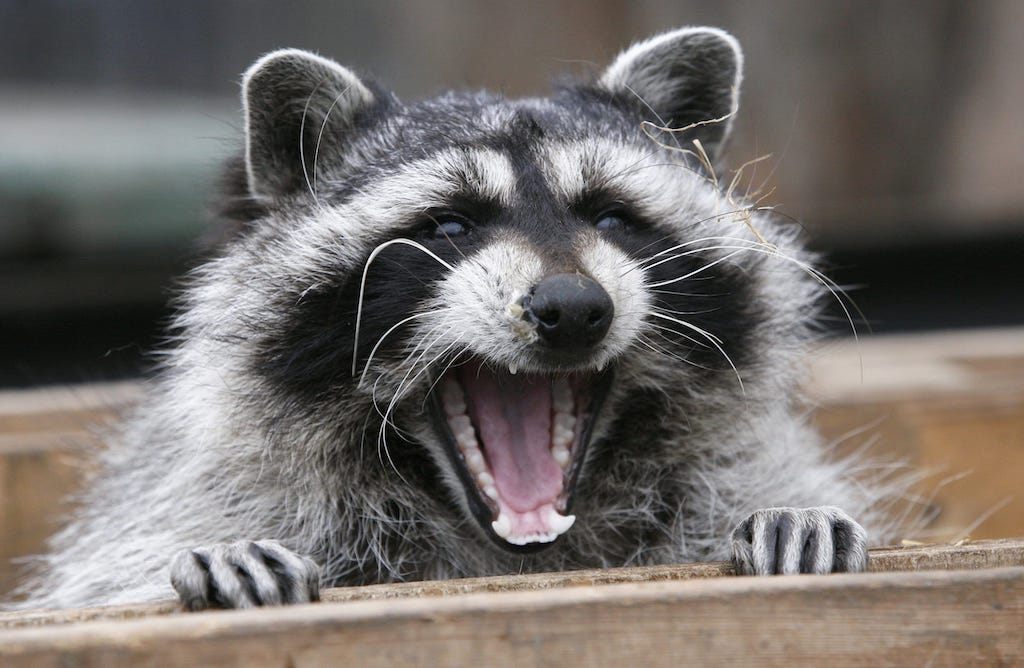Raccoon rabies is transmissible to humans, pets, and other livestock. The virus is extremely dangerous and can be fatal.
But is raccoon rabies something that you should be worried about. After all, the disease is pretty rare in wild animals in Ontario, and raccoons generally stay away from people, right?
Well, if you have raccoons on your property, you might want to take note of the information in this article and consider hiring a pest control service in Hamilton itself.
Rabid raccoons in Hamilton, Ontario
In December 2015, a locally trapped raccoon in Hamilton was found to have raccoon rabies after veterinary testing. That was the first recorded case of raccoon rabies in the province since 2005 and the very first ever case to be recorded in southwest Ontario. It was thought that the virus came across into Canada from infected animals across the border in the United States.
Over the following 19 months, more raccoons with rabies were found in areas around Hamilton, including, Brant County, Niagara, Halton, and Haldimand, Norfolk. Although some of the recorded cases of rabies among wildlife were striped skunks, the majority of cases identified between December 2017 and June 2017 did involve raccoons.
Rapid response
In response to the danger posed to the public by the rabies outbreak, local, federal, and provincial agencies collectively launched a number of incentives, including enhanced surveillance, a mass vaccination of domestic animals and wildlife, and a “Rabies is Real” public education campaign.
Today, raccoon rabies still presents a very real danger to you and your family. If you encounter raccoons on your property, do not approach or touch them. If you spot a raccoon that is behaving strangely or discover a dead one, report the incident to your local animal services. If you or your pets are scratched or bitten by a raccoon, contact your local public health department and have your pets vaccinated against the disease right away.
How to spot a rabid raccoon
There are certain typical signs to watch out for that could indicate that a raccoon may be rabid:
- Raccoons are nocturnal. If you see a raccoon out and about in broad daylight, that’s abnormal behavior, and you should steer clear of the animal.
- Raccoons can be susceptible to a number of diseases, as well as rabies. However, if you see a raccoon that appears to be sick, don’t risk it. Avoid the animal, and contact your local wildlife removal professionals for advice.
- Once the rabies virus is well-advanced, the affected animal will foam and froth at the mouth. If you see a raccoon with these symptoms, keep your distance.
- Most raccoons are vocal, but a rabid raccoon makes very strange sounds that simply don’t sound normal.
- Paralysis is a symptom of rabies, and a rabid raccoon will have problems with walking, appearing to stagger or find walking in a straight line difficult.
- Healthy raccoons are busy, active creatures that are highly intelligent. A rabid raccoon will appear slow, confused, and disoriented.
- Rabid raccoons can become very aggressive, losing their fear of humans and even of large, threatening animals that the raccoon would ordinarily avoid. Reports of a single rabid raccoon attempting to take on three fully grown cougars in a U.S. rescue center bear that out.
What to do if you encounter a suspected rabid raccoon
If you see a raccoon that you suspect has rabies, keep clear of the animal and report the sighting to a wildlife removal specialist immediately. Keep pets and kids indoors until the raccoon has been dealt with.
In conclusion
The 2015 raccoon rabies outbreak is easily the most significant and largest to have been recorded in Canada and is the first to be documented in an urban area with a high population. Although recent evidence suggests that the reported cases of rabies are declining, it’s likely to take many years before the disease can be eliminated altogether in wild raccoons.
If you have nuisance raccoons hanging around your property, contact your local professional wildlife removal firm for expert advice.

